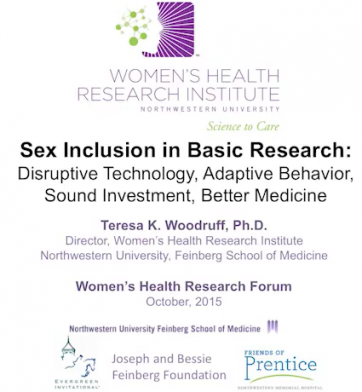 Last Tuesday, Women's Health Research Institute Director, Dr. Teresa Woodruff launched our 2015-2016 research forum lectures with her presentation entitled "Sex Inclusion in Basic Research: Disruptive Technology, Adaptive Behavior, Sound Investment, Better Medicine." Over 200 people were in attendance as Woodruff gave an overview of sex inclusion from bench to bedside, operating under her hypothesis that the next generation of biomedical advances that improve the lives of all people will require fundamental discovery research that includes sex as a variable. The current climate in science--which operates under the null hypothesis that sex does not matter in care--is upsetting and flawed, seeing as there are several ways sex (whether people or cells are male or female) impacts basic science and clinical care.
Last Tuesday, Women's Health Research Institute Director, Dr. Teresa Woodruff launched our 2015-2016 research forum lectures with her presentation entitled "Sex Inclusion in Basic Research: Disruptive Technology, Adaptive Behavior, Sound Investment, Better Medicine." Over 200 people were in attendance as Woodruff gave an overview of sex inclusion from bench to bedside, operating under her hypothesis that the next generation of biomedical advances that improve the lives of all people will require fundamental discovery research that includes sex as a variable. The current climate in science--which operates under the null hypothesis that sex does not matter in care--is upsetting and flawed, seeing as there are several ways sex (whether people or cells are male or female) impacts basic science and clinical care.
Women in the United States have shorter lifespans when compared to other developed countries. This is in part because the United States has yet to adopt a nation-wide understanding that healthcare for women varies from men in important, life-saving ways. One example is founded in cardiology--where women present symptoms of heart attacks differently than men, and women are more likely to downplay their symptoms in emergency situations, which many care providers may perceive as less critical. An important takeaway from the lecture is that our genes, hormones, environment, and anatomy all play important roles in our health and the sex-inclusion equation. Understanding how our biology impacts our health is a necessary step for the increased inclusion of female cells and animals in basic science, as well as female-inclusion as a variable in clinical science.
Watch the video of Dr. Woodruff's presentation, in case you missed it and check out our October eNewsletter, which outlines ways to get involved in clinical research.
